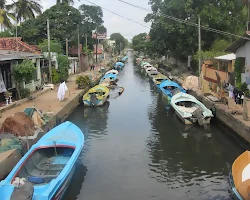A vibrant coastal city situated along the western shores of Sri Lanka, boasts a rich and storied history deeply intertwined with its colonial past. The city’s heritage primarily revolves around the influence of two European colonial powers – the Portuguese and the Dutch. Over the centuries, these colonial forces left an indelible mark on Negombo’s culture, architecture, religion, and way of life. This article delves into Negombo’s Portuguese and Dutch colonial heritage, shedding light on their contributions and enduring legacies.
The arrival of the Portuguese in the 16th century marked a significant turning point in Negombo’s history. Led by the intrepid explorer Lorenzo de Almeida, the Portuguese established a trading post in the area, setting the stage for centuries of colonial rule. One of the most enduring legacies of the Portuguese presence is the introduction of Roman Catholicism to the region. The St. Mary’s Church, a testament to this influence, stands as one of Negombo’s most iconic landmarks. Built in 1574, the church’s architecture mirrors a blend of European and local styles, showcasing intricately carved wooden elements and awe-inspiring religious artwork.
Another notable contribution from the Portuguese colonial era is the distinctive cuisine that has been woven into Negombo’s culinary fabric. The fusion of Portuguese and Sri Lankan flavors has given rise to dishes such as “Bolonhais,” a mouthwatering delicacy that highlights the interplay of ingredients and cooking techniques from both cultures.
In the 17th century, the Dutch wrested control of Negombo from the Portuguese, leaving an indelible imprint on the city’s landscape. The Dutch Fort, a magnificent architectural marvel, stands as a testament to their influence. Originally constructed as a military stronghold, the fort evolved into a vibrant hub that encapsulates the essence of Dutch colonial architecture. Its robust walls, characterized by coral and limestone, remain largely intact, offering a glimpse into the past and serving as a reminder of the city’s strategic importance.
The Dutch colonial period also saw the emergence of Negombo as a center for trade and commerce. The “Hamilton Canal,” named after Governor Gavin Hamilton, was instrumental in facilitating the movement of goods between the city and the capital, Colombo. While the canal no longer serves its original purpose, it serves as a historic relic that harks back to the heyday of Dutch colonial trade.
One of the most captivating aspects of it’s colonial heritage is the harmonious coexistence of diverse religious traditions. While Christianity, introduced by the Portuguese, and Dutch Reformed Protestantism left an indelible mark, other faiths also thrived in this melting pot of cultures. The “Kovil,” a Hindu temple, stands as a testament to the city’s religious diversity. Its colorful façade, intricate sculptures, and vibrant rituals offer a glimpse into the spiritual tapestry that defines it.
The Portuguese and Dutch colonial eras have had a lasting impact on Negombo’s identity, shaping its present-day landscape and culture. The legacy of colonial architecture can be observed not only in historic landmarks but also in the city’s layout, with winding streets and quaint buildings reminiscent of a bygone era. The fusion of European and Sri Lankan culinary traditions continues to tantalize taste buds, as Negombo’s food scene showcases a unique blend of flavors that pay homage to its colonial past.
Negombo’s Portuguese and Dutch colonial heritage forms a captivating narrative that has shaped the city’s identity, architecture, religion, and culture. The legacy of these colonial powers continues to thrive in Negombo, reflecting the enduring influence of historical forces on the present-day tapestry of this coastal gem. From the grandeur of the Dutch Fort to the spiritual sanctuaries that dot the landscape, Negombo stands as a living testament to the harmonious interplay of cultures and the resilience of a community shaped by its colonial past.

OURA Travel operates with the utmost dedication to offering exceptional experiences. While we endeavor to ensure accurate and enjoyable tours, our services are subject to availability and may change without prior notice. We bear no liability for unforeseen circumstances, injuries, or loss during the tours. Booking confirmation is contingent upon availability and adherence to our specific booking conditions, including terms and cancellation policies. Participants are advised to meet health requirements for travel, as we disclaim liability for issues arising from health or fitness limitations. Additionally, our descriptions are aimed at accuracy, although errors may occur, and we reserve the right to rectify any information or pricing inaccuracies.